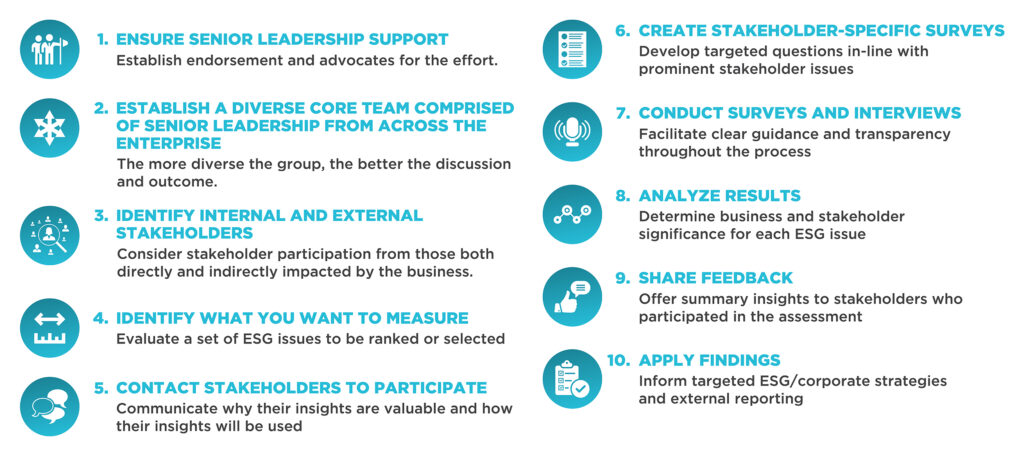
More than ever, companies are being evaluated based on their actions and impacts on various issues and metrics beyond traditional financial performance. Environmental, Social, and Governance (ESG) issues are reshaping and expanding the scope of conventional business considerations.
ESG can be viewed through several lenses—risk management/mitigation, value creation opportunities, and stakeholder management. Regardless of the lens, the first step in establishing an ESG strategy is understanding the business’s material issues. Once material ESG issues have been identified and evaluated within the business context, companies are better informed in developing corporate strategies and business plans, establishing policies and processes, and allocating resources to ensure that decisions made are in the best interest of the organization’s long-term health.
A materiality assessment is a commonly adopted practice to help a company determine the ESG issues most important to internal and external stakeholders. A 2019 survey of 50 sustainability executives showed that 92 percent of the respondents conducted a materiality assessment at the onset of their sustainability program or when reviewing sustainability strategy.
Although a materiality assessment requires time and resources, it is essential for gathering insights to develop a corporate ESG strategy, to inform an ESG, or business strategy. This paper highlights the value of conducting an ESG materiality assessment, key considerations, and leading practices that are foundational to developing a comprehensive corporate ESG strategy.

A materiality assessment is a structured exercise to evaluate the importance of specific ESG issues to internal and external stakeholders. ScottMadden recommends that companies perform a materiality assessment before establishing a formal corporate ESG strategy. The results should be refreshed every few years or in response to significant changes in the business or its operating environment (e.g., many companies refreshed their results in response to the business impacts of the COVID-19 pandemic).
Organizations face increasing and often competing demands from stakeholders, and no organization can focus on everything. The materiality assessment process creates alignment on those areas of sustainability most in need of attention or those most material to a company’s overall success.
Provides an unbiased and data-driven perspective from which management can approach ESG topics
An ESG materiality assessment offers a structured approach to evaluate a company’s material issues, paving the way toward setting effective ESG strategies and goals. The assessment helps identify and prioritize ESG topics, risks, and opportunities that potentially impact future business performance. A robust stakeholder assessment helps mitigate personal or internal bias as a company seeks to build or enhance its ESG strategy. The data-driven approach and accompanying analysis provide a level of scrutiny and legitimacy critical when discussing results across stakeholder groups who may have differing levels of comfort with ESG.
Facilitates a robust and inclusive approach for engaging stakeholders
By seeking the input of a broad range of individuals or entities, companies can connect with stakeholders in a new way, often uncovering previously unknown information about their priorities. Stakeholders also learn more about the company and its decision-making processes by taking part in the assessment process. This clarity can support positive stakeholder relations by demonstrating to critical groups that the company values their opinions. The feedback received in an assessment can supplement existing touchpoints that organizations have with customers, employees, interest groups, and other key groups.
Uncovers both external and internal insights
Understanding the thoughts, attitudes, and ideas of customers, investors, non-governmental organizations, regulators, community members, and others can reveal new business opportunities, identify or provide greater context of potential risks, or present improvements to existing practices. Materiality assessments allow a company to dig deeper into the minds of stakeholders to reveal more context where needed.
Similarly, internal to a company, discussing and understanding the perspectives and preferences of employees and executives can help determine which ESG information matters most to key decision-makers and how it should be incorporated into business practices. But the next level of analysis is just as important: evaluating the management approach. Here a company assesses its current strategy and opportunities for improvement in the context of material aspects.
Enables proactive, inclusive consideration of critical issues
This connection with stakeholders can allow a company to get ahead of concerns that could result in future regulation or negative public perception. Identifying the material impacts of a company’s actions on the economy, society, and the environment in a holistic way enables more timely discovery of less evident issues that, over time, may require action or result in critical consequences.
Encourage diverse and transparent stakeholder engagement
ESG Materiality assessments are most valuable when an organization can gather insights from inside and outside company walls to evaluate various perspectives across the value chain. Stakeholders should include those who can provide a consequential perspective on the company’s sustainability strategy, including internal (i.e., executive leadership, business-line directors, current employees) and external contacts (i.e., customers, investors/creditors, suppliers, NGOs, government entities, trade associations, etc.). Notably, stakeholders may only sometimes have a direct relationship with the organization. They may include those affected by an organization’s activities (e.g., the impacts of carbon emissions from high-emitting industries have a global impact that a local stakeholder may not raise).
Once stakeholders are identified, they should be contacted early to solicit their participation. Upon completion of the assessment, summary results and insights should be shared with stakeholders. In addition to ensuring transparency, sharing materiality assessment feedback can serve as a starting point for continuing the conversation and maintaining engagement across the company’s sustainability initiatives.
Utilize a formal, outcome-oriented methodology to yield the best outcomes
How To Conduct a Materiality Assessment
Materiality assessments should be structured engagements with stakeholders—not informal Q&As or workshops. A traditional survey format is an effective and easy tool to capture and analyze results. It is critical to know what the company wants out of each section when designing the assessment and crafting questions for each stakeholder group to inform future decisions. A materiality assessment can be most valuable if designed to inform strategy development, specific initiatives, goals, and, eventually, reporting strategies.
Though the process is relatively straightforward, conducting a thorough materiality assessment is not a task that should be rushed. It requires significant buy-in across the organization and dedicated time and resources to complete. For companies that have yet to engage in ESG-related discussions, time is necessary to level-set the purpose and intended outcomes of a materiality assessment.
The typical process for carrying out a materiality assessment includes the following steps:

Leverage the materiality assessment to inform metrics and drive strategic and business planning
ESG Materiality assessments can improve detail in areas where it is difficult to have objective measures. External audiences can identify issues that leadership previously may have sensed but needed more data to address through connecting with a wide variety of stakeholders, bringing objectivity to the problem and informing strategy and reporting.
However, many organizations limit the assessment’s impact by ending with a report and not an action. Instead, it should be a tool to inform strategic planning across the organization’s operations. Once a strategy is determined, the organization should set goals, develop initiatives, allocate resources, and measure progress, as with any business planning effort. The value of the assessment is diluted if not linked to strategy and business planning.
Do it right every three to five years
If done well and consistent with the scope of your business, a corporate ESG strategy should not change significantly year over year. Outside influences like regulation, or significant events like COVID-19, may result in a noticeable shift in an organization’s operating context and warrant a new assessment. Still, most incremental changes are minor and do not result in a major growth in materiality. For that reason, standard practice is an in-depth assessment every three to five years supported by lighter “recalibrations” to periodically check and adjust the metrics and enable stakeholder engagement in new or different ways. These recalibrations should not substantially change the metrics tracked, as maintaining year-over-year consistency is essential for performance management.
As the expectations and requirements for businesses to incorporate ESG considerations into their strategy and operations continue to evolve and primarily increase, it is essential to understand and prioritize material issues. ESG materiality assessments are essential strategic planning practices that establish data-driven foundations, encourage stakeholder engagement, and allow organizations to align ESG strategy to long-term business planning.
ScottMadden is the management consulting firm that does what it takes to get it done right. We consult with a wide range of clients across numerous industries with deep expertise in Energy and Corporate & Shared Services. We deliver a broad array of consulting services, from strategic planning to implementation.
View More

Sussex Economic Advisors is now part of ScottMadden. We invite you to learn more about our expanded firm. Please use the Contact Us form to request additional information.